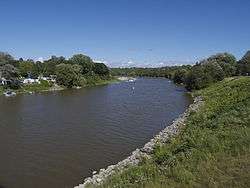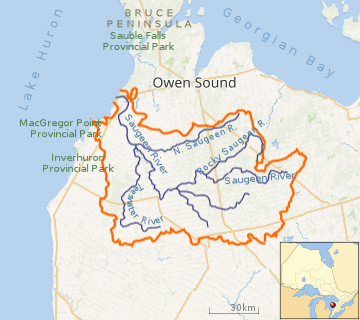Saugeen River
The Saugeen River is located in southern Ontario, Canada. The river begins in the Osprey Wetland Conservation Lands and flows generally north-west about 160 kilometres (99 mi) before exiting into Lake Huron. The river is navigable for some distance, and was once an important barge route. Today the river is best known for its fishing and as a canoe route.
| Saugeen River | |
|---|---|
 Saugeen River in Southampton, about 1 km from its mouth at Lake Huron | |
| Location | |
| Country | Canada |
| Province | Ontario |
| Region | Southwestern Ontario |
| Counties | |
| Physical characteristics | |
| Source | Wetland |
| • location | Osprey Wetland Conservation Lands, Grey County |
| • coordinates | 44°14′58″N 80°21′12″W |
| • elevation | 525 m (1,722 ft) |
| Mouth | Lake Huron |
• location | Southampton, Bruce County |
• coordinates | 44°30′03″N 81°22′25″W |
• elevation | 190 m (620 ft) |
| Length | 160 km (99 mi) |
| Basin features | |
| River system | Great Lakes Basin |
| Tributaries | |
| • left | South Saugeen River Teeswater River |
| • right | North Saugeen River Rocky Saugeen River |
 |
| Map showing the Saugeen River system, in the part of Bruce County south of the Bruce Peninsula, and in Grey County. The orange line shows the Drainage basin of the river system.[1] |
The river's name comes from an Ojibwa language word Zaagiing, meaning outlet. Another source is more specific, indicating that "Saugeen" is the corrupted form of the Ojibwa word meaning the entrance or mouth of the river.[2]
Course
From its source in the Osprey Wetland Conservation Lands, the Saugeen River flows westerly before briefly turning to the north and flowing through the village of Wareham. After leaving Wareham, the river turns west again before then flowing southwest and crossing Ontario Highway 10. After crossing the highway the Saugeen meanders to the south-southwest before turning west again and then turning to the north and flowing through the village of Priceville. After reaching Priceville, the Saugeen flows generally westward and parallels the old route of Ontario Highway 4. The Saugeen flows westward into the town of Durham where it falls over McGowan Falls, a cascade waterfall in the Durham Conservation Area. Upon exiting the Durham Conservation Area the river crosses Ontario Highway 6 in downtown Durham. After leaving the town of Durham the Saugeen River turns northwest where it takes in the Rocky Saugeen River. Shortly afterwards the Saugeen makes a sharp turn to the south. Flowing south, the Saugeen takes in the Styx River before taking in Camp Creek near the village of Allan Park. The Saugeen then turns west again, once again paralleling what was once Highway 4. The Saugeen River then skirts the northern edge of the town of Hanover before entering the Darroch Nature Reserve where it takes in the South Saugeen River. The Saugeen River then continues flowing west until it makes a sharp north turn near the town of Walkerton. The Saugeen then flows north through Walkerton and continues north-northwest. The Saugeen River then enters the town of Paisley where it takes in the Teeswater River in the center of the town and then takes in the North Saugeen River just north of Paisley. The river then continues northwards through the Saugeen Bluffs Conservation Area and then flows north into Denny's Dam Conservation Area. The Saugeen then turns west and enters the town of Southampton; it crosses Ontario Highway 21 at the Zgaa-biig-ni-gan Bridge before emptying into Lake Huron.
Tributaries
The river has two main tributaries; the South Saugeen and the North Saugeen. The South Saugeen begins near Ventry while the North Saugeen's source is located near Holland Centre. The North Saugeen meets the Saugeen just north of Paisley, about 24 kilometres (15 mi) south-southeast of its exit into Lake Huron; the South Saugeen joins the Saugeen about 35 kilometres (22 mi) further southeast, near the town of Hanover.
- Mill Creek (left)
- North Saugeen River (right)
- Teeswater River (left)
- South Saugeen River (left)
- Beatty Saugeen River (right)
- Camp Creek (left)
- Styx River (right)
- Rocky Saugeen River (right)
Communities
Saugeen River
North Saugeen River
- Chesley
- Scone
- Williamsford
South Saugeen River
Rocky Saugeen River
Hungerford's crawling water beetle
The North Saugeen River is home to one of the most critically endangered of all insects: the Hungerford's crawling water beetle. In fact, the only known population of Hungerford's crawling water beetles outside of the United States were discovered near Scone in Bruce County, Ontario. In 1986, 42 beetles were identified at a site downstream from a dam there. An unspecified number of beetles were last recorded in 2001, but surveys in 2002 uncovered no specimens. As a result, the status of this population of Hungerford's crawling water beetles is uncertain at present.
Although the Hungerford's crawling water beetle was categorized as endangered on March 7, 1994, under the provisions of the U.S. Endangered Species Act, it is currently not protected in Canada.
See also
| Articles about places in |
| Bruce County, Ontario |
|---|
| Municipalities in Bruce County |
| Settlements in Bruce County |
| Coastal landmarks and locations |
| Protected Areas |
| Rivers and Lakes |
- Saugeen Valley Conservation Authority
- List of Ontario rivers
References
- "NHN National Hydro Network - GeoBase Series: Drainage Basin 02FC000". Natural Resources Canada. Retrieved July 16, 2018.
- "Bruce County". Electric Scotland. Alastair McIntyre. 2015. Retrieved 4 March 2017.
From the book History of the County of Bruce, Ontario, Canada, by Norman Robertson (1906)
- "Bruce County Maps". brucecounty.on.ca. Retrieved 7 July 2018.
External links
| Wikimedia Commons has media related to Saugeen River. |